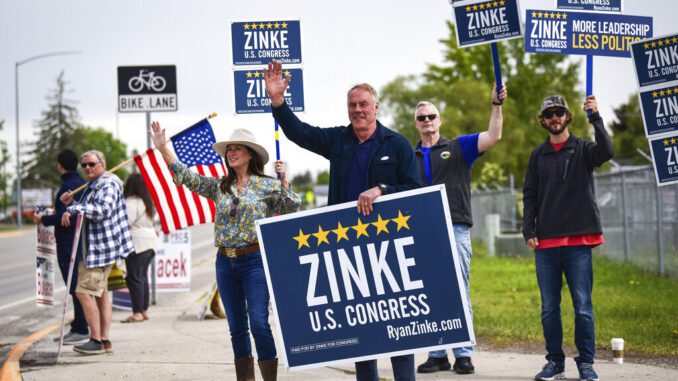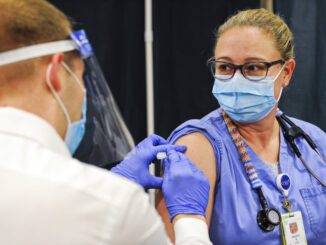
HELENA, Mont. — Ballot printing errors have delayed election results for Montana’s new congressional seat, forcing a small northwestern county to count votes by hand in the unexpectedly close Republican primary race between former Interior Secretary Ryan Zinke and former state Sen. Al “Doc” Olszewski.
Zinke led Olszewski by 1,181 votes, or 1.5 percentage points, out of 80,194 votes counted, as of 3:30 p.m. local time Wednesday. Lincoln County had an estimated 6,000 ballots to hand count.
Zinke, a former Navy SEAL, was considered the favorite in the race and had been endorsed by former President Donald Trump.
“The race appears to answer the question of whether President Trump is a ‘kingmaker,’ as Zinke has previously said,” said Christina Barsky, a University of Montana professor who teaches classes in election administration, government and public budgeting.
The trouble in Lincoln County stemmed from a vendor printing the ballots on the wrong-sized paper, meaning they could not be run through a machine tabulator, the secretary of state’s office said Wednesday. By law, ballots have to either all be counted by machine or all counted by hand, spokesperson Richie Melby said.
Lincoln County Clerk and Recorder Robin Benson said in a statement that the hand count was expected to take two to three days. Election officials started counting ballots on Tuesday.
“We remain confident and believe the Secretary’s lead will continue to grow as more votes are counted,” Zinke campaign spokesperson Heather Swift said Wednesday afternoon.
Drew Zinecker, spokesperson for Olszewski’s campaign, said they were “cautiously optimistic we will emerge from the (Lincoln County) count victorious.”
Zinke may have been hindered by attacks that he is not a “real” Montanan, given the time he spends out of state and that his wife has declared her primary residence to be in California to receive a property tax break, Barsky said.
Those criticisms “may resonate particularly with residents facing the housing crunch experienced in western Montana,” she said.
“It was noted that Zinke did not attend all GOP events in advance of the primary — for instance an April debate in Kalispell,” Barsky said, adding that Montanans are used to seeing their representatives out in the community.
The Montana Democratic Party also weighed in.
“Whether or not Zinke is able to maintain his lead, the fact that Zinke — who came into the race with a Trump endorsement, national name recognition and more than four times the money as his opponent Dr. Al Olszewski — could not pull out a decisive victory could spell trouble for the unity of the Republican party this November,” the party said in a statement.
Zinke’s tenure in the Trump administration was marked by federal investigations into his travel, political activity and potential conflicts of interest. One investigation determined Zinke lied to an agency ethics official about his continued involvement in a commercial real estate deal in his hometown.
Zinke resigned in early 2019, writing that “vicious and politically motivated attacks” against him had “created an unfortunate distraction” in fulfilling the Interior Department’s mission.
Montana gained its second congressional seat through redistricting after the 2020 census. Zinke had represented Montana in the state’s other congressional district before leaving to join the Trump administration.
The winner of the race between Zinke and Olszewski will face Democrat Monica Tranel, an attorney, in November.



